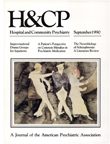The Effect of Borderline Personality Disorder on the Hospital Course of Affective Illness
Abstract
Two groups of patients with affective disorders, one group with a coexistent axis II diagnosis of borderline personality disorder and one group without, were compared to determine if the presence of borderline personality disorder affects the hospital course of patients with affective illness. Response to hospital treatment was assessed using standard psychiatric rating scales administered at admission, after one week of hospitalization, and before discharge. Although the patients with borderline personality disorder were more severely impaired than the comparison group, they were as likely as patients without the disorder to improve over the course of hospitalization.
Access content
To read the fulltext, please use one of the options below to sign in or purchase access.- Personal login
- Institutional Login
- Sign in via OpenAthens
- Register for access
-
Please login/register if you wish to pair your device and check access availability.
Not a subscriber?
PsychiatryOnline subscription options offer access to the DSM-5 library, books, journals, CME, and patient resources. This all-in-one virtual library provides psychiatrists and mental health professionals with key resources for diagnosis, treatment, research, and professional development.
Need more help? PsychiatryOnline Customer Service may be reached by emailing [email protected] or by calling 800-368-5777 (in the U.S.) or 703-907-7322 (outside the U.S.).



